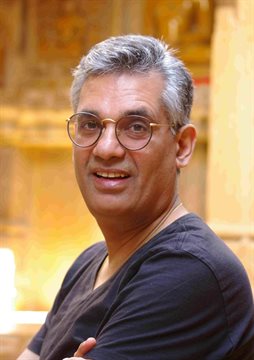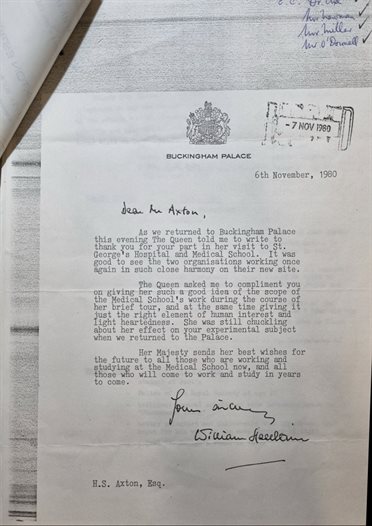Published: 01 February 2023
We are delighted to share the news that St George’s Class of 1982 alumnus, Professor Sunil Shaunak, has been awarded an OBE for services to Infectious Diseases and Drug Discovery.
Professor Shaunak, an Emeritus Professor in Infectious Diseases at Imperial College London, works in the Department of Infectious Diseases at Hammersmith Hospital. Throughout his career, he has been a champion for equitable global access to affordable medicines. He spoke to us about what inspired him to pursue a career that combined infection with drug discovery, and he shared his reflections on being among the first pre-clinical students on our Tooting site.

"Many people were involved over the years and I am grateful for all their help and support.”
Reflecting on how it felt to receive the award, he says: “It is wonderful to be honoured in this way. Many people were involved over the years and I am grateful for all their help and support.”
When Professor Shaunak first qualified as a doctor, his experience treating AIDS patients eventually led him to create a Trust that has funded work into affordable medicines for infections:
“I became involved in caring for some of the first AIDS patients in Kenya. Although we examined the patients, made their diagnosis and wrote the prescriptions for free, they had to buy their own pills. This came as quite a shock having come from the NHS; the cost of the drugs meant that many young people died.”
Professor Shaunak worked closely with one patient, Mr Williams, whose memory remains close to his heart:
“I worked with Mr Williams in London to help prolong his life; he only asked for a little more time so he could be with his partner. When he died and left me half his estate, so I used it to set up the Williams Trust. It has acted as a springboard for new projects exploring accessible medicines, and it has provided valuable seed funding when such money was hard to find.”
Over the past 40 years, he has developed cost-effective new medicines for Hepatitis C, leishmaniasis, AIDS and Shigella. He has also enabled the development of better biopharmaceutical products as a co-founder of Abzena (formerly known as PolyTherics).
Speaking about the advances that he has seen over the course of his career, Professor Shaunak says: “They have been truly remarkable, with the increase in lifespan being beyond anything we could have imagined as students at St George’s in the 1970s.”
“Half a century ago, medical education was so very different.”
Professor Shaunak was part of the ‘guinea pig year’ cohort of alumni, so-called because they were the first students to attend the new Tooting pre-clinical medical school. It is here that Professor Shaunak also met his wife, Dr Anita Oates, a fellow medicine alumna and doctor.
His first impression of St George’s was of “a vibrant new faculty that wanted to integrate medical education across traditional disciplinary boundaries. There was a genuine sense of community.”
He shares how medical education has changed since he first arrived at St George’s as a student:
“Half a century ago, medical education was so very different. St George’s had just appointed June Lloyd as its first female Professor.
In my year of 80 students, there were only six from ethnic minorities, and all were men; so different from the university’s student intake of today. This change did not come easily. We have Professor Joe Collier to thank for his efforts in highlighting the inequality of opportunity that existed at London medical schools.”
- Professor Sunil Shaunak -
"The Queen’s arrival in the lab led to a spontaneous increase of my heart rate to 120.”
One of Professor Shaunak’s lasting memories as a medical student was the visit from Her Majesty Queen Elizabeth II to open the new Tooting medical school. He was chosen to demonstrate the power of propranolol (beta-blockers).

He explains: “The aim of our experiment was to block my heart’s beta receptors with intravenous propranolol and set my heart rate at 50. In the Queen’s presence, I would be given intravenous noradrenaline (a stimulator) to show that it could not increase my heart rate.
“Despite being fully beta blocked, the Queen’s arrival in the lab led to a spontaneous increase of my heart rate to 120! My Professors, Joe Collier, and Brian Robinson were embarrassed that the experiment had failed, and astonished that the simple act of the Queen’s arrival had overwhelmed propranolol’s blocking action on my heart.”
A letter from the Palace following the Queen’s visit noted that she “was still chuckling about her effect on your experimental subject when she returned to the Palace.” (right)
“Whichever discipline you decide to pursue, it’s got to be something that you will want to get out of bed for every single day.”
Speaking about how his time at St George’s influenced his career, Professor Shaunak says:
“Professors Humphrey Rang FRS and David Colquhoun FRS (Pharmacology) were instrumental in stimulating my interest in drugs and receptors. The vibrancy of their teaching led me to combine infectious diseases and drug discovery as the core elements of my academic career.”
Sharing advice with current students considering their next steps, he adds: “Whichever discipline you decide to pursue, be passionate about it. It’s got to be something that you will want to get out of bed for every single day. Despite the setbacks that will inevitably come your way, you will need to be driven if you want your work to have a lasting impact.”